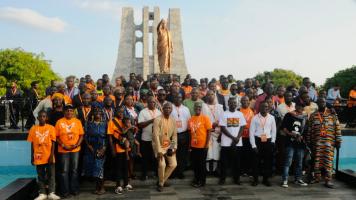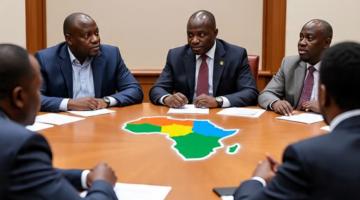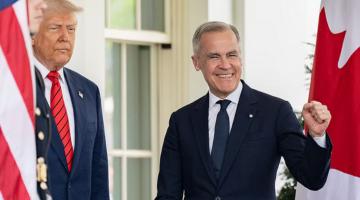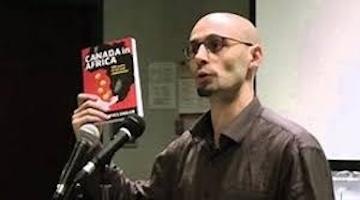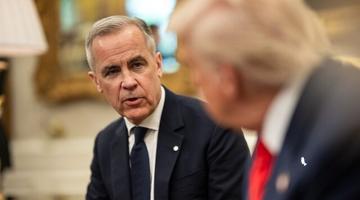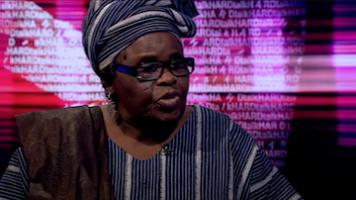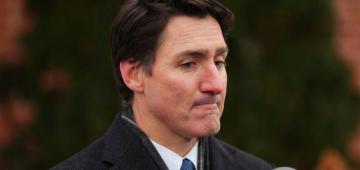Ghanaian President Kwame Nkrumah. Image from the cover of Kwame Nkrumah and the Dream of African Unity by Lansiné Kaba (Diasporic Africa Press, 2017).
April 27, 2022 is the 50th anniversary of Kwame Nkrumah's death. He was ousted from the Ghanaian presidency by Canadian trained elements of his own military who were also supported by the CIA. Canada's actions were in keeping with its role as a partner of US imperialism.
This article was originally published in Canadian Dimension.
On April 27, 1972, former Ghanaian President Kwame Nkrumah died in Bucharest, Romania, at the age of 62. Just five years earlier, elements of Ghana’s military launched a coup against him—their country’s first president, independence leader, and an internationally recognized icon of the global movements for pan-Africanism, African socialism, and Cold War non-alignment. The forces that removed Nkrumah were supported and trained by Western powers, including Canada.
The coup d’état was a largely CIA-engineered reaction against Nkrumah’s deepening alliances with the Soviet Union and Maoist China, as well as his state’s commitment to transitioning Africa away from an outward-oriented neo-colonial dependency and toward an inward-facing national and ultimately continental development plan.
Nkrumah was threatening to spur other African states to follow Ghana’s development model, as Salvador Allende and Fidel Castro did in Latin America. From the Western point-of-view, Ghana’s socialist project had to be nipped in the bud, and the perpetrators of the coup had no illusions about where support originated from. As William Blum points out, “those Ghanaians who carried out the coup suffered from no doubts that a move against Nkrumah would be supported by the Western powers.” Former CIA officer John Stockwell later admitted that the Agency station in Accra “was given a generous budget, and maintained intimate contact with the plotters as a coup was hatched.”
As a leading theorist of pan-Africanism, Nkrumah declared that he and his allies were “not fighting for African liberation only, we are fighting also for the political unification of Africa, for without unity there can be no future for the African People.” Zanzibarian Marxist leader Abdulrahman Mohamed Babu outlines the emancipatory origins and goals of pan-Africanism in his 1990 speech at the International Conference on Malcolm X:
The idea of ‘African Unity’ was conceived as a means of fighting two scourges inflicted on Africa by colonialism. One was the fragmentation of the continent, which resulted in weak and unviable states; the second was poverty, which was a consequence of fragmentation, extensive colonial exploitation and an illogical and primitive colonial economic structure which obstructed development. These two scourges were inter-linked, designed to facilitate colonial domination and exploitation.
Babu, Nkrumah, and other pan-Africanists believed that only through continental unity could these “two scourges” be expelled and rectified.
In Nkrumah’s own writing, most notably 1965’s Neo-Colonialism (which he dedicated to “the Freedom Fighters of Africa, living and dead”), the president himself researched the mechanisms by which Western exploitation of Africa’s material wealth functions. Walter Rodney, another indispensable scholar of European colonialism in Africa, borrowed from Nkrumah’s work while writing How Europe Underdeveloped Africa. He writes that “Research by Dr. Kwame Nkrumah revealed that direct private investment by American investors in Africa increased between 1945 and 1958 from 110 million dollars to 789 million dollars, most of it drawn from profits.” Meanwhile, “official estimates of profits made by United States companies” over the same period came to approximately $1.2 billion.
Rodney uses these statistics to study the rate of growth of US, British, and French investments in the final decades of formal colonialism, arguing that they demonstrate a disproportionate rate of growth for the US in relation to European powers—in other words, while British and French investments in Africa lagged, US investments on the continent surged. This increased US interest in Africa explains why the CIA took a leading role in organizing the 1966 coup against Nkrumah.
On foreign policy, Nkrumah was one of several principal champions of non-alignment, alongside Egypt’s Gamel Abdel Nasser, India’s Jawaharlal Nehru, Indonesia’s Ahmed Sukarno, and Yugoslavia’s Josip Broz Tito. He participated in many important “Third World” conferences in Africa and abroad, including the 1955 Bandung Conference, which Indonesian president Sukarno described as “the first intercontinental conference of coloured peoples.”
The CIA had certainly taken notice of Nkrumah’s writings and his political aspirations for Africa. As Liberated Texts editor Louis Allday explains, the CIA’s Historical Intelligence Collection read and reviewed Neo-Colonialism for the Agency’s deputy director and identified the “Mechanisms of Neo-Colonialism” chapter, which names the US as the worst exploiter of Africa in the neo-colonial era, as being “of greatest interest to the CIA.” Multiple CIA departments studied the book, including the African Division of the Deputy Directorate for Plans (DDP). The internal review concludes by saying that, after investigating the book’s contents, the Agency should take “whatever action these components consider advisable.”
Three months later, the CIA-backed coup took place. Blum reports that, in addition to Nkrumah’s removal, the CIA station in Accra also proposed that “members of the agency’s Special Operations Group… be on hand, with their faces blacked, [to] storm the Chinese embassy, kill everyone inside, steal their secret records, and blow up the building to cover the fact.” John Stockwell stated that although the embassy raid was ultimately abandoned, the Agency considered its anti-Nkrumah operation a great success.
Numerous anti-colonial leaders in Africa had also identified Canada as a supporter of imperialist US policies on the continent. Patrice Lumumba described Canada as “just another imperialist power,” while Nasser characterized Canadian peacekeepers in Africa as “a force serving neo-imperialism.” One can see evidence for these accusations in Canada’s extensive support for the perpetrators of the coup against Nkrumah, and the reaction of Canadian leaders to his ouster, which ranged from conspicuous silence to undisguised celebration.
The military officers who deposed Nkrumah received training from Canadian advisors. Canada’s junior staff officers ran a training program at the Ghanaian Defense College, and Canada’s high commissioner in Accra C.E. McGaughey noted that “All the chief participants of the coup were graduates of this course.” McGaughey lauded this fact, writing in an internal memo to External Affairs after the coup that “a wonderful thing has happened for the West in Ghana and Canada has played a worthy part.” Furthermore, he applauded the new military government for having “thrown the Russian and Chinese rascals out.”
After Ghana secured its independence from Britain, Western powers took notice of the crucial role that the military could play in Western power projection in the country. In addition to the training course, several Canadians occupied senior positions in Ghana’s conservative Ministry of Defense. Colonel Desmond Deane-Freeman, Canada’s military attaché to Ghana, noted that the purpose of having Canadians in these positions was to impart “our way of thinking” onto Indigenous African officials. In 1965, McGaughey noted that in the postcolonial period, Ghana’s military had changed “less than any other institution. It is still equipped with Western arms and… is Western oriented.”
McGaughey’s cables note that, among some sectors of Ghanaian society, Canada’s influence over the military and its strategic deployment of aid policies aligned with the political goals of the US and Britain. Indeed, it is difficult not to note that Canadian aid to Ghana increased considerably following the coup. Yves Engler explains: “During the three years between 1966 and 1969 the [military government] received as much Canadian aid as during Nkrumah’s ten years in office… Ottawa was the fourth [largest] major donor after the US, UK, and [the] UN.”
Nevertheless, McGaughey lamented that “for some African and Asian diplomats stationed in Accra, I gather that there is a tendency to identify our aid policies particularly where military assistance is concerned with the aims of American and British policies.” Oddly, he voiced his inability to understand why US and British policy agendas were not “above criticisms or suspicion” in Africa and Asia.
While the post-Nkrumah military government destroyed the president’s socialist project and massively liberalized the country’s economy, later governments would go further, accepting IMF structural adjustment programs and transitioning toward an even greater export orientation. Cynthia Kwakyewah and Uwafiokun Idemudia describe the immediate impact of these policies on the Ghanian economy:
Ghana was forced to devaluate its currency, adopt a flexible exchange rate, decrease inflation, reduce public services and government spending (especially on education, health, and welfare), eliminate trade barriers, privatise public enterprises, and stimulate economic growth through export.
Canadian investments in Ghana grew in combination with the country’s liberalization, especially in the mining sector. Gold is the country’s most profitable export, and by 2005, 11 major Canadian mining companies operated there: Birim Goldfields, Nevsun Resources, Moydow Mines International, St. Jude Resources, PMI Ventures, AMI Resources, AXMIN, Alcan, IAMGOLD, Golden Star Resources, and Akrokeri-Ashanti Gold Mines. This massive resource wealth does not translate to profits for the people of Ghana. In fact, the modern Ghanaian state is a model of Western-backed liberalization in West Africa, allowing foreign companies to repatriate up to 95 percent of their profits from the mining industry.
Canada’s material support for conservative anti-Nkrumah elements in the Ghanaian military is well-documented. One must also situate the country’s role in Nkrumah’s removal within the broader history of Canadian aversion to pan-Africanist integration, evidenced by its anti-Lumumba stance in the Democratic Republic of the Congo, its welcoming of the 1987 coup against Thomas Sankara, and its lengthy and extensive support for apartheid in Southern Africa, which only dwindled when world opinion began to turn against the fascist regimes. Nkrumah’s removal was “a wonderful thing for the West” insofar as it toppled one of the most significant pillars of pan-Africanism on the continent, paving the way for the wider dismantling of the project’s political efficacy.
In 2012, Canada’s Governor General Michaëlle Jean visited Ghana and laid a wreath on Kwame Nkrumah’s tomb. Such a commemorative gesture reads as wholly disingenuous given Canada’s role in removing the pan-Africanist leader from office and the unwillingness of Canadian leaders to acknowledge this fact, let alone assume a degree of responsibility for its historical consequences.
Owen Schalk is a writer based in Winnipeg. His areas of interest include post-colonialism and the human impact of the global neoliberal economy. Visit his website at www.owenschalk.com.

